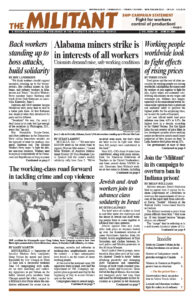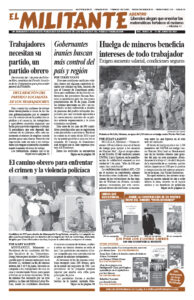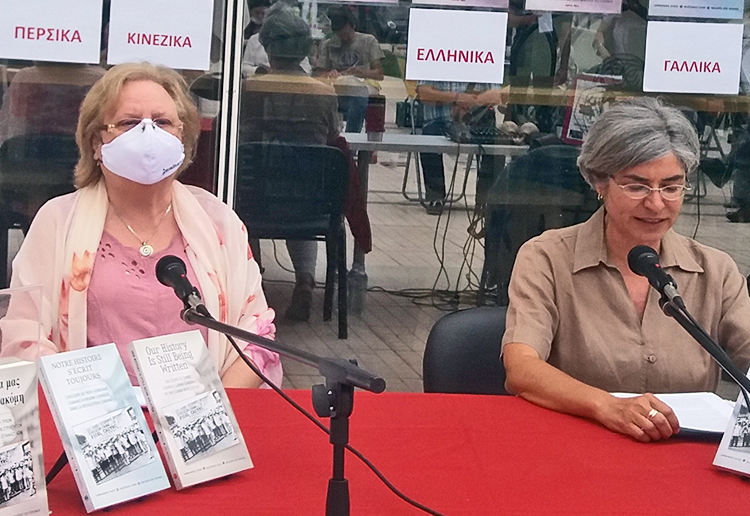ATHENS, Greece — Publisher Diethnes Vima publicly launched its newly released Greek-language edition of Our History Is Still Being Written: The Story of Three Chinese Cuban Generals in the Cuban Revolution here May 30. The book is a series of interviews with Armando Choy, Gustavo Chui and Moisés Sío Wong, three Chinese Cuban generals who joined the revolutionary struggle in Cuba as teenagers. The meeting was held at the outdoor venue of the Serapheio Athletic Complex.
The 65 people at the event included steelworkers, airport workers, school teachers, janitors, metro workers, retail and warehouse workers, tech-sector workers and others interested in learning more about the Cuban Revolution. Members of different associations doing solidarity work with Cuba and campaigning against Washington’s more than 60-year-long economic war against Cuba participated in the event.
Behind the speakers were attractive blowups of the covers of the book in the six different languages in which it has been published — English, Spanish, French, Farsi, Chinese and now Greek.
Natasha Terlexi, chief editor for Diethnes Vima, chaired the meeting. “This new book is the 12th in a series of books published by Diethnes Vima on the history and program of the Cuban Revolution. They provide an essential tool for our class as we face the consequences of the capitalist crisis on our lives,” she said. “All these books were translated, edited, and page set by workers, many who are here with us.” Terlexi introduced close to a dozen who “volunteer their time after their jobs.”
“In the 19th century, Cuba fought for its independence from Spain,” the Cuban ambassador to Greece, Zelmys María Domínguez Cortina, said. “In that fight the Cuban nation was formed, the melting pot where whites, blacks, mestizos, Chinese were united, all those who fought for the independence of Cuba from the Spanish colonial yoke.”
Cuban people made a revolution
“It was not until 1959 that true independence was achieved in Cuba and the people took charge of their destiny with the revolution led by Fidel Castro,” she said. “Many wonder why Cuba was able to resist. The answer is the Cuban people, who are the true architect of their history, who were the ones who made their socialist revolution.”
This book “shows this Cuban reality and its history in the voices of Cuban descendants of those Chinese coolies who were brought to Cuba in the 19th century to replace African slaves, and of others who arrived later. For many it is a surprise to know that the Cuban nation was nourished not only from Africa and Spain but also from China,” Domínguez Cortina said. “In Havana a monument is erected to the fighters of Chinese origin with a phrase that highlights the pride and dignity of those, since it says, ‘There was not one Chinese-Cuban traitor.’”
Terlexi then introduced the next two panelists as working-class fighters. Vasilis Revelas, a volunteer who worked on the book, works in the technology industry and helped lead a successful fight against company firings during the COVID-19 confinement, she said. Nasos Pavlakis, a metal worker, was a “rank-and-file leader of the nine-month strike at the Halivourgia steel mill.”
Revelas said he was 24 when a co-worker, one of the founders of the Diethnes Vima, invited him to a book presentation like today for “Capitalism’s Long Hot Winter Has Begun,” by Socialist Workers Party National Secretary Jack Barnes in New International no. 12. The article “explains that we have entered the early stages of a prolonged global economic downturn,” he said, with “decades of economic, financial and social upheaval and class struggles ahead.”
“A year later, my co-worker gave me the English version of Our History Is Still Being Written. The first book he introduced me to explains the cause of the problems we see in the world today, in our lives and our jobs,” Revelas said. “Today’s book shows us what we can do about these problems.”
Revelas explained that he comes from a family of Greek immigrants who lived in apartheid-era South Africa. The battle against racism in Cuba and Cuba’s role fighting side by side with the Angolan people in their struggle for independence that’s discussed in the book impressed him. “Moisés Sío Wong says this is mainly because we have put an end to unequal property relations. This is what made it possible for a Chinese child to be a representative of the government. The difference lies in the triumph of the socialist revolution,” Revelas said.
“During our strike,” Pavlakis said, the workers withstood “the bosses’ attacks for nine months due to our unity and the solidarity” they got. “The Cubans have withstood the U.S. assaults for over 60 years. How is that possible? By reading this book we learn that in Cuba solidarity is a holy word. We see the possibilities of a different society where the exploitation of man by man is no longer.” This book “allows us to see our humanity.”
Greetings were presented by Yannis Tsalavoutas on behalf of the José Martí Cultural Association-Solidarity with Cuba; Haig Apamian, president of Popular Solidarity; Dina Kaklamanaki, one of the translators of the book; and written greetings were read from Nikos Karandreas, a long-time leader of solidarity work with Cuba in Greece.
The evening was closed by a live musical program by Cuban singer and guitarist Remy Mailan, who brought the crowd to its feet to dance.
Participants bought 15 copies of Our History Is Still Being Written — 13 in Greek, one in Farsi and one in Chinese. Eight other books on revolutionary working-class politics, translations of titles by Pathfinder Press in the U.S., were also sold.
At the José Martí Cultural Association table, signatures were collected on a petition against the U.S. embargo. So far 2,800 people have signed.


